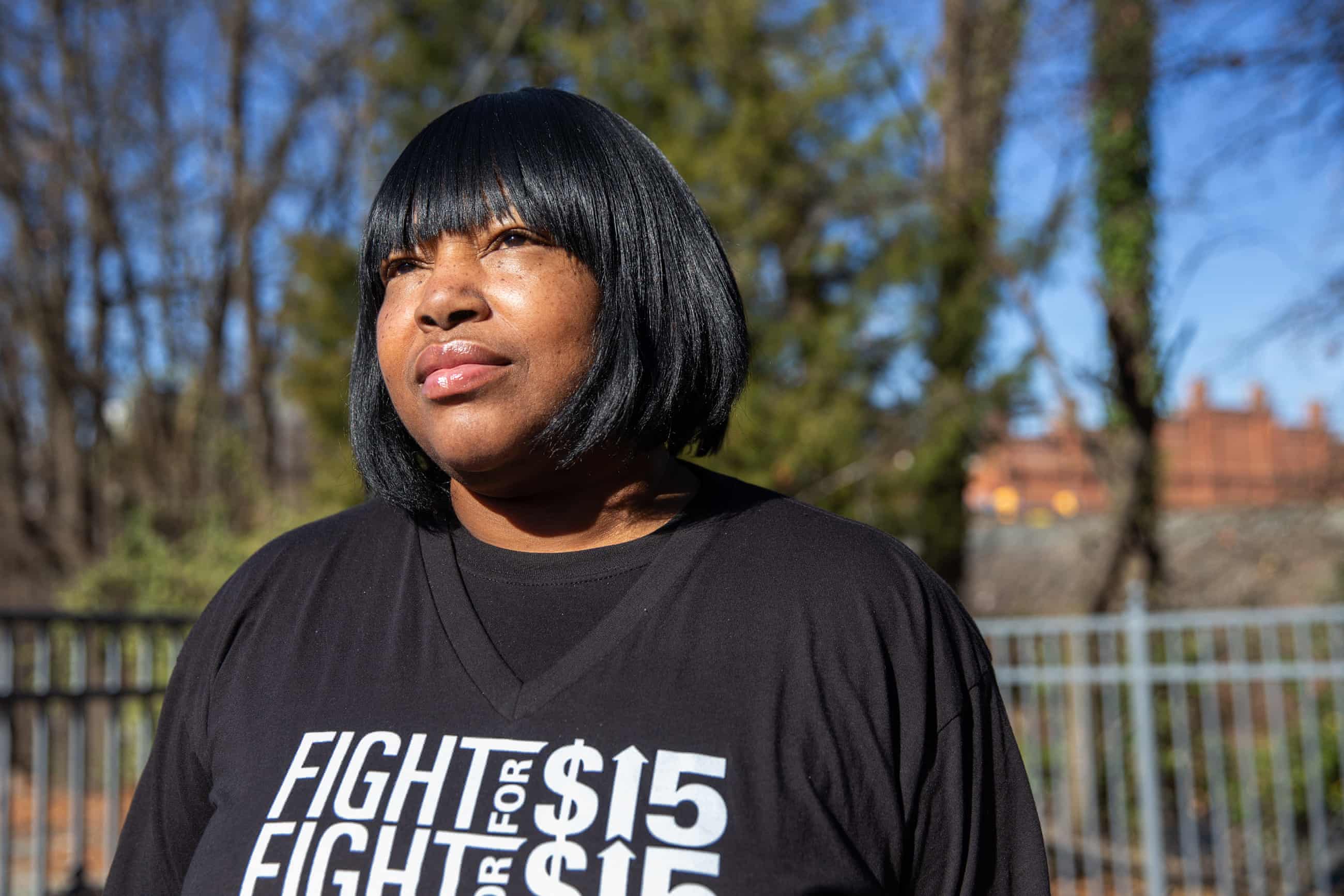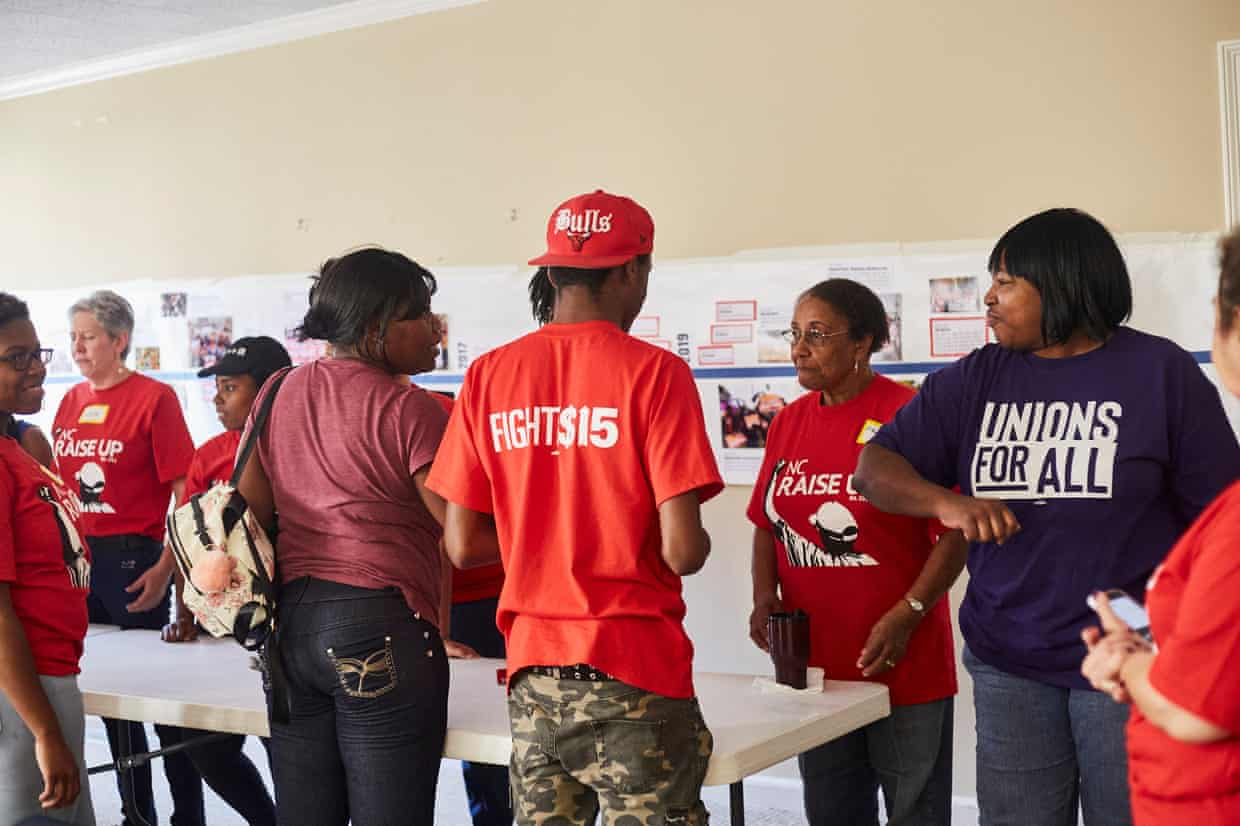
Stretched to the limit
'I suffer through it': how US workers cope without paid sick leave
The US is one of just a few high-income countries globally that do not guarantee sick leave, forcing many to work when they are not medically fit to do so
by Miranda BryantWanda Coker has life-saving dialysis every Monday, Wednesday and Friday morning.
Despite feeling tired, nauseous and suffering cramps from the four-hour treatments that do the job her kidneys can no longer can do, the 52-year-old rushes back from the clinic to her home in Durham, North Carolina. She changes into her work uniform, drives an hour through traffic to Burger King and somehow summons the energy for a 10-hour shift. She finally gets home at around 2 or 3am.
As a manager at the fast-food restaurant, Coker works a minimum of 50 hours a week across five shifts, leaving her little time to rest or recover. For over two years, this has been her weekly routine.
“The days I’m off I pretty much try to catch up on sleep if I can because I don’t sleep a lot,” she said. “I just basically have to suffer through it … I take whatever I can for pain, which is only about Tylenol while I’m working. I have to work because we don’t have any paid sick days.”
The US is one of just a handful of countries globally that do not guarantee paid sick leave. According to World Policy Centre data, the US, Palau and South Korea are the only three high-income countries not to offer the basic right to their citizens.
This leaves workers suffering from life-threatening illnesses and conditions such as kidney failure and cancer with little option but to work when they are not medically fit to do so, and having to go to extraordinary measures to fit treatment around their jobs.
Coker’s strength and resilience confound even medical professionals. “Most of the time my doctors are like: ‘Ms Coker I don’t know how you do it to go and work 50 hours a week because we know that dialysis is straining on you,’” she said.
When her doctors offer to write her sick notes for work, she declines. “I wouldn’t be able to pay my bills.”
After years of inaction in the US, national conversation around the issue of paid family leave – which can include childbirth, serious illness and caring for a sick family member – has started to gain political ground, and has become a policy point in the 2020 US election.
Most of the Democratic presidential contenders support paid family leave and, for the first time, many Republicans are taking an interest in paid parental leave – including Donald Trump. But national policy remains a long way off.
Coker, who lives with her daughter, granddaughter and son-in-law, first started having problems with her kidneys about four years ago. It came to a head when she was driving to work in May 2016 and started vomiting uncontrollably. She ended up spending a week in hospital with pneumonia – during which her kidney function spiked and didn’t return to normal.
While people can live for years on dialysis, the process is notoriously hard-going. In the two years that Coker has been having treatment, five of her fellow patients have died. It is also emotionally gruelling. “I’ve seen a therapist and we have a social worker at dialysis, so I talk to her a lot about the situation and they do what they can to help.”

She hopes to get a kidney transplant. She is currently looking for a donor, which can take three to seven years. Burger King has offered her $2,500 towards the cost of the transplant, but she said her bosses could do more to support her.
“They send me text messages like: ‘You need to do a better job of getting to work on time.’ And to me I’m like, how can I do a better job of getting to work on time when I have a set time that I’m on the machine, which is four hours?”
Instead she thinks they should give her two of her dialysis days off so that life would not be such a struggle.
If her condition deteriorated and she was physically unable to get to work, she said she would have to file for disability benefits, which after four weeks would drop to a fraction of her salary, making it impossible to pay her mortgage and bills.
She is eligible for up to 12 weeks of unpaid leave from work under the Family and Medical Leave Act (FMLA), but could not afford to live without an income.
“I barely make enough money now to afford all this stuff [bills and living costs], especially with the medication that I have to take right now.” She currently pays about $143 a month for medicines alone and a further $104 a month on Medicare and $58 a week on health insurance.
A national paid family leave law guaranteeing sick leave would improve her life enormously. “Instead of having to go to work all these days that I’m sick or tired or just feel like I can’t make it I could actually be able to be off,” she said. She also thinks companies like Burger King should pay for all of their employees’ healthcare. Currently, she believes, only some employees have access to health insurance.
Through her work as a local leader for the global worker movement Fight for $15, Coker comes across people in similar situations to hers every day. She said a fellow Burger King manager had a heart attack at work. When he called a district supervisor to say he was having chest pains and needed to leave, she claims, he was not allowed to close the store early. “He actually had the heart attack in the store and had to leave the store in an ambulance and someone else came to keep the store open. It’s ridiculous.”
Burger King and Burger King franchisee Carrols Corporation did not respond to multiple requests for comment.
Just 40% of workers have access to short-term disability benefits, according to recent US government figures, and 34% to long-term disability. Although private companies are increasingly starting to introduce paid family leave policies, many of them do not include paid leave for serious illness.
Of the about 60% of workers who are eligible for unpaid leave under FMLA, many, like Coker, cannot afford to take it.
Some states – such as in California, New Jersey and Rhode Island – have their own paid medical leave programmes, but there is no protection nationally.
Sarah Fleisch Fink, vice-president for policy and strategy at the National Partnership for Women & Families, which is campaigning for paid family and medical leave and paid sick days, condemned the “broken system”.
“It’s terrible. People in this country, some people who don’t even have access to unpaid job-protected leave, so people who aren’t covered by the Family and Medical Leave Act, can lose their jobs if they need chemotherapy treatment or dialysis and they’re working and they can’t find another way to accommodate that treatment.”
For Darsheen Sargent, 47, not having paid leave meant going to work every day in considerable pain. The part-time home care worker from Seattle suffered third-degree burns across her body during a house fire in August.
After taking about two weeks unpaid time off, she was still in pain physically and emotionally, suffering from post-traumatic stress disorder and anxiety, and coping with the damage to her home and possessions. But she needed the money and she was worried about losing her job.
“Even now, I’m wary when I need to take time off if I’m in too much pain – I just push past it. Every day I cry and say, God I just wish I had time to just heal,” said Sargent, a single mother of three adult children and a 10-year-old daughter.
While her employer has been accommodating – giving her lighter jobs and helping her out after the fire – the process has still been extremely painful.
“With the pain and you’re not able to really just function and focus it’s very hard and you’re not sleeping, so you’re running off just, I don’t know, grace.”